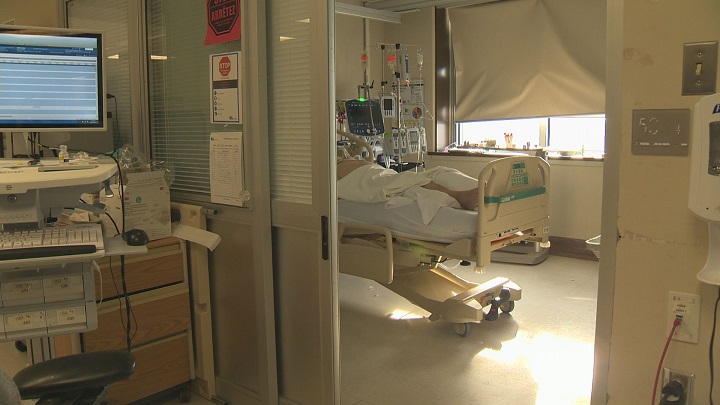There are no speeches or ceremonies being held in the auditorium at Cornwall Community Hospital.

With the health care facility running over-capacity, the auditorium has been turned into a new ward with cubicles for 11 patients.
Right next door, the speech therapy and occupational therapy rooms are being used to create four more beds, yet the director of the acute medicine department says space remains a challenge.
“It’s still very much overflowing,” Paula Sleeman says.
Cornwall Community Hospital (CCH) is the biggest hospital in the Eastern Ontario Health Unit. It’s a mostly rural region south of Ottawa, tucked up against the Quebec border.
The Omicron wave has hit the region and the hospital hard. Space is only one challenge.
This week, 38 staff members are off sick with COVID-19. Last week it was 50, and it’s been as high as 75.
In recent weeks, Sleeman says staffing has been such a problem it’s been, at times, unsafe. The acute medicine department would normally have 12 nurses on duty, but on some days as many as five were off sick. The department had a stretch of about 10 days when Sleeman says the patient-to-nurse ratio made it hard to deliver care safely.
- ‘Shock and disbelief’ after Manitoba school trustee’s Indigenous comments
- ‘Super lice’ are becoming more resistant to chemical shampoos. What to use instead
- Is home ownership only for the rich now? 80% say yes in new poll
- Invasive strep: ‘Don’t wait’ to seek care, N.S. woman warns on long road to recovery
“It has reached that level,” Sleeman says. “Knock on wood, we’re not there this week.”
The hospital has created a “redeployment committee” that looks at what’s needed and how holes can be filled. One of its recent creative solutions has just been extended. The committee moved an employee who normally works in an off-site warehouse to the acute medicine department. The woman’s deployment was originally to be for just two weeks, but has been extended another two.
CCH was one of the first hospitals in Canada to start planning for COVID-19. In February 2020, when Canadian tourists were exposed on cruise ships in Japan, some of them were quarantined in Cornwall at the NAV Canada facility just three minutes from the hospital.
“We’re going into year three now,” says nurse Kelsey Lauzon. “It’s exhausting, and it doesn’t seem like there’s an end in sight.”
The hospital’s intensive care department has been overwhelmed as well. Dr. Paul Westergaard, chief of the critical care unit, says his department has 13 patients in a 12-bed unit. The extra patient is being cared for on another floor.
“We’re over capacity every day,” Westergaard says. “It’s been this way for the last few weeks.”
Pre-pandemic, the ICU would have patients recovering from surgeries. With Ontario postponing all non-urgent elective surgery, those post-op patients aren’t there — COVID-19 patients have taken their place.
“This weekend, we hit 100 per cent COVID patients,” Westergaard says. “That’s a record for us.”

One part of the hospital that feels almost abandoned is the hallway where operations are performed. CCH has six operating rooms; right now only one is being used. Medical equipment that would normally be in the operating rooms is in the hallway instead. Dr. Garry Weinberg, the chief of surgery, says the scene is surreal.
“My hallway should be busy and bustling,” Weinberg says. “Instead, there’s a ghost town. It’s apocalyptic, in a way.”
Most of the OR staff has been redeployed to other floors. Weinberg says sacrificing surgeries had to be done. The hospital needed to move his staff to keep running, but it was painful.
“In many ways,” he says, “we’re cutting off the arm to let the rest of the body survive.”
Weinberg says there is a push by some surgeons in the province to find a more appropriate term than “elective surgeries.” Using the word “elective,” he says, implies they’re a choice. He suggests it would be better to refer to “scheduled surgeries,” so the public and politicians could understand their importance.
“They are absolutely necessary,” Weinberg says. “Surgery has been scheduled, and now we have unscheduled it for over two years.”
Weinberg says important procedures are being delayed, and doctors’ abilities to detect problems early have been blunted. Things like breast cancers and colon cancers are being found later than pre-pandemic — something that often means more advanced chemo and radiation treatments.
“People will end up passing away,” Weinberg says, “without a doubt, because of the delay in screening and delay in getting treatment.”
Another challenge for CCH has been outbreaks of COVID-19 in long-term care facilities. The hospital has patients who have recovered from COVID-19 and other ailments, but who can’t be moved to their LTC home because of outbreaks there. The hospital normally has about 30 patients waiting to be moved. Right now that number is over 60.




Comments